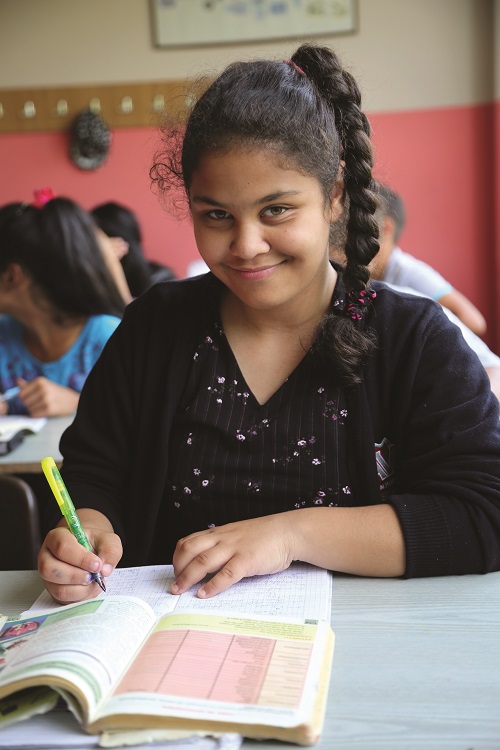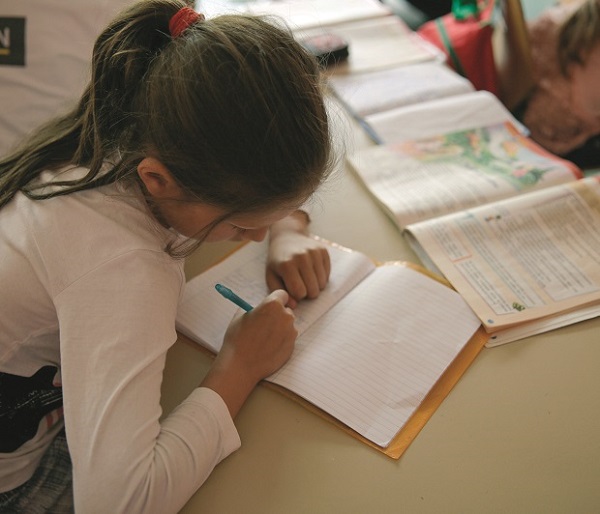By Blake Tommey
Estera loves to read.
In her fifth-grade class at the Ruth School, Estera’s favorite subject by far is the Romanian language, and she lives to devour children’s novels. But some of her most cherished stories are the parables that Jesus tells in the Gospel of Luke, many of which she now knows by heart.
“My favorite parable from the Bible is the story of The Lost Sheep,’” Estera said.
For Estera, understanding God isn’t a complicated process. God is simply the kind of God who goes after lost things, who looks for and after those who have been cast away or fallen through the cracks — especially Roma children just like Estera.
‘They were always hungry’
This is one of the stories from the Ruth School, an organization sharing Christ’s great love through literacy ministry among Roma families living in poverty. The Ruth School serves 240 children, 80 percent of whom are Roma, and provides literacy training and educational recovery to kids of all ages.
With support from the Cooperative Baptist Fellowship’s Offering for Global Missions, the Ruth School seeks to empower students and help them to integrate into Romanian society.
Located in the Ferentari neighborhood of Bucharest, a poor and marginalized community, the Ruth School operates as part of Project Ruth, a partnership between Romanian Baptists, CBF and its field personnel Ralph and Tammy Stocks, as well as Providence Baptist Church, a Ferentari congregation that founded the school in 1992 to address the glaring needs of children in their neighborhood.

“Originally, the young people of Providence Baptist noticed that Roma children were roaming the streets at all hours of the day and evening, so they decided to invite them in,” said Ralph Stocks, one of CBF’s field personnel and area coordinator for ministry teams.
“They quickly noticed two things,” he said.
They saw that some of the kids, even as old as 10 to 12, couldn’t read or write. They also noticed how famished the kids were.
“It seemed like they were always hungry and couldn’t get enough,” he said.
Marginalized for their origins
So the church launched a literacy club which was the beginning of the school that would address the other needs, he said.
Roma children often experience tremendous discrimination in public schools, Stocks said, though the law allows them to enroll and attend. Once there, Roma students are typically labeled as mentally deficient and corralled into their own classroom with the newest or most inadequate teachers. This leads to extremely widespread and deep discouragement early in their lives, not to mention illiteracy, he added.
In Romania and across Europe, Roma communities continue to experience systematic discrimination and many countries uphold a tradition of open hostility toward the ethnic group. Where many Roma are concentrated in Bucharest, hate speech is a usual occurrence and Roma, young and old, are largely denied economic opportunities like employment or proper schooling.
Teaching literacy is fundamentally an economic issue, emphasized Georgiana Mitran, a former Ruth School student.
“As a human, being literate is so important, because it helps you enlarge your opportunities in life,” Mitran said. “There is actually a possibility that one day you will become a doctor, a lawyer or anything else you want to be. When I was a child, I wanted to be a successful adult and I realized that I could only achieve that goal through education.”
Mitran first came to the Ruth School as a 16-year-old who had only completed the third grade. She was denied enrollment in the local public schools and the Ruth School was the only opportunity she had to complete her basic education.
After a few years, Mitran completed literacy training and became a caregiver with the after-school program at Project Ruth. Mitran and her husband now have two children — Mathias, a first-grader at the Ruth School, and Maya, who attends the nursery school. She wants to instill in her son and daughter not only the value of education but also their own intrinsic value as children of God.
“The most important thing for these children to understand, especially Roma children, is that they are marginalized solely because of their origins,” Mitran said.
“As a child I was a subject of this prejudice: ‘You are Roma, so you are stupid.’ But that is not true,” she said. “God put value into these children, and we must make it possible for them to develop as they should.”
‘It opens a whole world to them’
Beginning with kindergarten and moving through eighth grade, the Ruth School is making such development possible for Estera, Mathias and all of their fellow students, primarily by ensuring they can read and write in Romanian. But Mihail Ciopasiu, executive director of Project Ruth, pointed out that teaching your neighbor is about much more than reading and writing.
“The Ruth School is not just about providing basic education, which is compulsory according to the Romanian curriculum, but rather about approaching the child in a holistic way,” Ciopasiu said.
He said that means providing daily hot meals, school supplies, an after-school program, IT classes, an English club and various sports activities.

“All these programs come together to help our students carry on with their education,” Ciopasiu said.
Hot meals is one of the most critical steps in the educational process, Ciopasiu said, because many families lack the resources to send their child to school with a lunch.
The school also employs a social worker tasked with identifying children with special needs and helping many of them make the transition to high school after the completion of their primary education.
Tammy Stocks, CBF field personnel and area coordinator for mission teams, said the ministry in Bucharest is about transformation beyond color, beyond ethnicity and beyond income.
“One of the ways you break the cycle of poverty is through education, so we emphasize that to our students because many of them come from very impoverished situations,” Stocks said. “When you are literate, it opens a whole world to you.”
